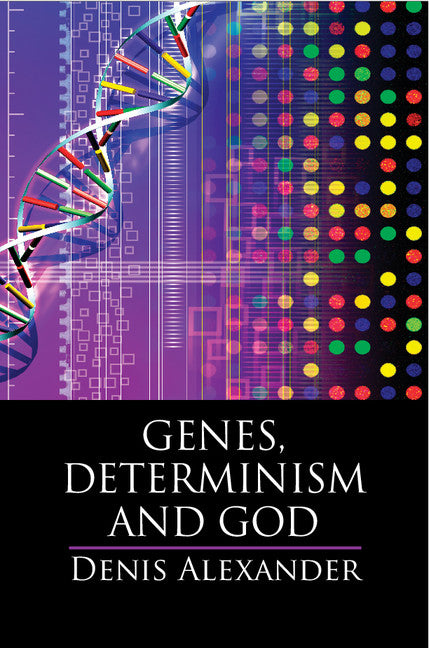Freshly Printed - allow 4 days lead
Couldn't load pickup availability
Genes, Determinism and God
How does genetic variation impact on behavioural differences and how does this relate to free will and personal identity? Denis Alexander examines these questions.
Denis Alexander (Author)
9781107141148, Cambridge University Press
Hardback, published 10 July 2017
392 pages
23.5 x 15.8 x 2.7 cm, 0.67 kg
'Anyone who wants to know the current state of scientific research in genetics, and its relevance to difficult issues about human development, including the vexed issue of sexual orientation, will find in this book a masterly and balanced survey. It comes from someone who is well aware of the enormous implications for theology of current research, and, in particular, its relevance to arguments about free will.' Roger Trigg, Theology
Over the past centuries the pendulum has constantly swung between an emphasis on the role of either nature or nurture in shaping human destiny, a pendulum often energised by ideological considerations. In recent decades the flourishing of developmental biology, genomics, epigenetics and our increased understanding of neuronal plasticity have all helped to subvert such dichotomous notions. Nevertheless, the media still report the discovery of a gene 'for' this or that behaviour, and the field of behavioural genetics continues to extend its reach into the social sciences, reporting the heritability of such human traits as religiosity and political affiliation. There are many continuing challenges to notions of human freedom and moral responsibility, with consequent implications for social flourishing, the legal system and religious beliefs. In this book, Denis Alexander critically examines these challenges, concluding that genuine free will, often influenced by genetic variation, emerges from an integrated view of human personhood derived from contemporary biology.
1. Human personhood fragmented?: nature-nurture discourse from antiquity to Galton
2. Reifying the fragments?: nature-nurture discourse from Galton to the twenty-first century
3. The impact of the new genetics?: how contemporary biology is changing the landscape of ideas
4. Reshaping the matrix: integrating the human in contemporary biology
5. Is the worm determined?: gene variation and behaviour in animals
6. Prisoners of the genes?: understanding quantitative behavioural genetics
7. Behavioural molecules?: understanding molecular behavioural genetics
8. Mensa, mediocrity or meritocracy?: the genetics of intelligence, religion and politics
9. Gay genes?: genetics and sexual orientation
10. Not my fault?: the use of genetics in the legal system
11. Causality, emergence and freedom?: tackling some tough philosophical questions
12. Made in the image of God?: a conversation between genetics and theology.
Subject Areas: Cognition & cognitive psychology [JMR], Spirituality & religious experience [HRLK], Theology [HRLB], Philosophy: epistemology & theory of knowledge [HPK], Genealogy, heraldry, names & honours [HBTG]


